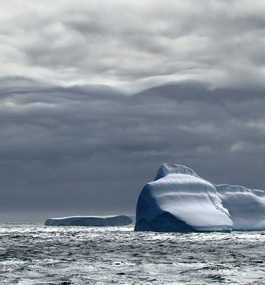‘Gust off the Glacier’
A poet embarks on a richly creative exploration of Antarctica.

Elizabeth Bradfield
Icebergs, Bransfield Strait
by Laura Gardner, P’12
In 1995, while browsing a used-book store, Elizabeth Bradfield, associate professor of the practice of English and co-director of the creative writing program, discovered a copy of “Endurance,” Alfred Lansing’s classic account of Sir Ernest Shackleton’s failed Antarctic expedition.
“I was hooked,” she says, and an obsession with Earth’s southernmost continent was born.
In the 1990s, Bradfield became a naturalist guide on small ecotourism expedition ships, work that sprang from a yearlong deckhand gig she took soon after receiving a BA in English and women’s studies from the University of Washington (she would later earn an MFA at the University of Alaska Anchorage).
She loved being on the water. Between jobs, she felt “land-bound,” she says.
Bradfield was also writing poetry, which was published widely and earned prestigious awards. In 2005, she founded Broadsided Press, a digital publishing project that creates monthly poster-size mashups of literature and the visual arts, which art lovers can print out and post on the streets for others to enjoy.
Yet her two lives — the creative and the nautical — didn’t mix at sea. “In ‘naturalist mode,’ I was too busy being present and answering questions and keeping to schedule. I could not drift inward in the way that writing poems requires,” she writes in the preface to her most recent book, “Toward Antarctica” (Red Hen Press, 2019).
In the austral summer of 2011, Bradfield finally got the chance to embark upon her first Antarctic expedition, joining an ecotourism team of biologists, ornithologists, geologists and botanists. Traveling to and through Antarctica — “a dreamed-of place,” she calls it — made her feel like she had to write during the journey. This voyage, significantly longer than any other she had taken, would give her more time to create.
Still, Bradfield needed to figure out a way “to open myself to writing and remain present in the manner that my job required,” she writes. That solution turned out to be haibun, a form of writing popularized by the 17th-century Japanese poet Matsuo Basho, who spent months traveling in remote parts of Japan. Haibun combines a prose poem — “jotted diary-like prose,” says Bradfield — and haiku. The form captures a poet’s external journey as it unfolds, seemingly in real time, along with her internal emotions and experience.
“Toward Antarctica” is the result. It’s a collection of poems, prose, interesting footnotes and photographs Bradfield took in Antarctica in 2011-12 and again in 2016-17. Each page describes an encounter, an experience, a moment or an observation.
Her writing is as spare, craggy and austere as the place she writes about. It is also dense and evocative — like the melding strata of water, ice and sky her photography reveals. The cadences range from measured and serene to abrupt and clipped, tossing you as if you’re on deck in a roiling sea.
In “Point Wild, Elephant Island,” Bradfield writes:
Rough. Chop on top of swell. Passengers stagger the gangway. I idle bow in, wait my turn for pickup. Gust off the glacier — hunch away — slaps my shoulder like a stupid cousin …
surly ice licks down
tastes chop, fractures to brash
spittle hisses the keel
Her deft descriptions of the wildness of land and sea dovetail with her photographs, which document marine life with fine detail and scientific observation. The lines of the poem “Sea Day” — “dissolve dissolve / what the water offers / what I’d like to take it up on” — are accompanied by a photo of a smooth black iceberg against a 50-shades-of-gray ocean and menacing low-slung clouds.
Bradfield says, “The work I do as a naturalist is coequal to my work as a writer. One really feeds the other. The time outside looking, questioning, builds up a desire to be inside at the desk, wondering.”
Students say Bradfield is also an inspired guide in the classroom, with an unvarnished eye and a supportive sensibility. “She knows when to guide you and when to let you find your way,” says Sarah Terrazano ’19, an English-instruction teaching assistant in Madrid.
Rachael Hershon ’18 began studying with Bradfield as a first-year and completed an honors thesis in creative writing under her mentorship. “She helped me create a unique voice as a writer by helping me channel what she would call a ‘hard, critical eye’ toward the subjects and places in my work,” says Hershon, a seventh grade English teacher in Waltham, who plans to pursue an MFA this year. “Without Liz’s classes and our one-on-one work together, I would not be the writer I am now.”
Bradfield teaches students the true nature of poetry, Terrazano says: “Something valuable I gained early on is that poetry isn’t something to keep just for yourself — words exist to be shared, beautifully, with the world.”
Luckily for us, Bradfield follows her own advice.
